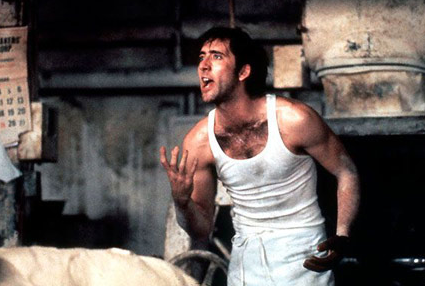When you’re a woman, whether of the 80s or now, there is only one man–and it’s Ronny Cammareri (Nicolas Cage) from Moonstruck. His intensity, constant state of glistening from allover sweat and ability to put a bun in the oven (oh the metaphors) make him even more irresistible than Nicolas Cage’s character in Valley Girl.
The chip on his shoulder is too large to remove when Loretta Castorini (Cher) first encounters him at the bakery where he works to invite him to her wedding to his brother, Johnny Cammareri (Danny Aiello, who somehow scored the jackpot of working with a large majority of the quintessentially gay icons in the 80s–see also: “Papa Don’t Preach” video). Although Loretta has never met Ronny and it’s been five years since he even talked to Johnny, she is carrying out Johnny’s wish to invite him to the ceremony while he returns to Sicily to be there for their mother as she’s on her deathbed. Ronny blames Johnny for the loss of his hand after Johnny asked him for some bread, which Ronny put in the slicer, became distracted while talking to Johnny and then got his hand caught in the machine. As a result, Ronny loses not just his hand, but his bride-to-be at the time. Hence, Ronny declares, “What’s wrong can never be made right.” Loretta later likens this to his inner wolf cutting off its own paw to get out of a trap–the trap of a bad relationship. Stunned by her frankness and instant knowledge of his very being, Ronny takes her to his bedroom, and the two officially fall in love after seeing an enormous full moon shining on them from outside the window.
Regardless of Ronny’s gradual softening as his heart opens to Loretta, his rough-hewn, tell-it-like-it-is ways–seamlessly built into his character by screenwriter John Patrick Shanley (who never quite recreated the same magic with subsequent scripts)–continue to prevail. The day-old bread texture of his persona is in part a result of years of solitude and disappointment, but also stems from the Southern Italian blood coursing through his veins, making misery and theatrics a natural part of his existence. Even when he is forced to admit how he feels about Loretta, his manner is tinged not just with romanticism, but utter fatalism, confessing, “Loretta, I love you. Not like they told you love is, and I didn’t know this either, but love don’t make things nice–it ruins everything. It breaks your heart. It makes things a mess. We aren’t here to make things perfect. The snowflakes are perfect. The stars are perfect. Not us. Not us! We are here to ruin ourselves and to break our hearts and love the wrong people and die. The storybooks are bullshit. Now I want you to come upstairs with me and get in my bed!”
How could anyone–man or woman–resist such a proposal? This is, of course, why Loretta can’t marry Johnny in the end. He’s got no zest, no seasoning ingratiated into the dough of his body (and his body is quite doughy). Moreover, he doesn’t have the passion to hold grudges; Ronny has the sort of vitriolic contempt steeped inside of him that’s needed to love with such abandon.



















